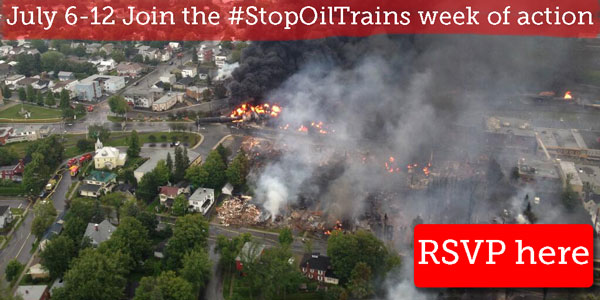---------- Forwarded message ----------
From: Drew Hudson, Environmental Action <action@environmental-action.org>
Date: Tue, Jun 28, 2016 at 1:31 PM
Subject: Did you see this Liz? RE: It "looked like the apocalypse!"
To:

From: Drew Hudson, Environmental Action <action@environmental-action.org>
Date: Tue, Jun 28, 2016 at 1:31 PM
Subject: Did you see this Liz? RE: It "looked like the apocalypse!"
To:
 |
| I wanted to make sure you saw my email from last week about our upcoming week of actions to stop volatile crude oil shipments by rail. We're still a few events short of our goal of 100 gatherings to #StopOilTrains, and we specifically need more people to host and attend near Bellingham. I know you've taken action with us on climate change and fossil fuels before, will you check it out? You can RSVP or offer to host an event. Or if you're not able to participate in person, you can chip in to support those who can. Thanks, Drew and the Ban the Bomb Trains Crew at Environmental Action There are 25 million Americans who live within a mile of a train line that moves volatile crude oil. These so called "bomb trains" are a threat to public safety and an affront to climate action that demands we keep fossil fuels in the ground. Click here to join the #StopOilTrains week of action and help us ban the bomb trains. Liz, Twenty five million Americans live inside a bomb-train blast zone -- that's the one mile radius around rail tracks that routinely carry shipments of volatile oil.1 Just a few weeks ago, another one of these trains derailed in Oregon, igniting a blaze that one of the first responders told Oregon Public Broadcasting "looked like the apocalypse."2 Looking back on the tragedy in Lac-Mégantic Canada, where a runaway train carrying 72 tankers filled with volatile bakken oil from America derailed and killed 47 people -- we know the blast zone is a dangerous place to be.3 But bomb trains aren't getting more rare, they're getting more dangerous and more frequent. Which is why they've done more damage in the past three years than the previous four decades combined.4 From July 6 to 12th, our movement is coming together to do something about it. Together, we can #StopOilTrains with our voices and our bodies. But to make this work we need to do more than speak up, we need to show up and support the folks on the front lines. Will you help support the 3rd annual Stop Oil Trains Week of Action?
 Dozens of activists have already planned events in Seattle, Albany and many other cities. And starting an event in your town is easy! Some events will involve a handful of people taking a photo near the tracks in their town. Others will be big marches through our largest cities. Whatever you have in mind, every gathering is part of this important national movement. We know that when we stand up and fight back, we win -- against bomb trains and all forms of extreme energy. We've seen it at the Break Free week of actions, when organizers in Washington and Albany blocked the tracks to obstruct bomb train traffic for hours or days.5 And we've seen it more recently when the Mayor of Portland and the Oregon Department of Transportation joined our call to ban the bomb trains.6 But those kind of victories require real people standing in the streets and on the tracks to stop pollution and protect our communities. You can participate in a variety of ways this July as part of the week of action: You can host an event, or attend and hold a sign. You can plan a big, noisy rally. OR you can organize a quiet vigil. But whatever you do, it's essential that we say loud and clear that we have the right to know what kind of dangerous materials are shipped through our community, and there's a fierce moral urgency to keep fossil fuels in the ground and ban these bomb trains for good.
Drew and the Ban the Bomb Trains Crew at Environmental Action 1 - Blast Zone Map, Forest Ethics 2 - Katie Herzog, Oregon explosion reminds us that oil trains are "weapons of mass destruction", Grist, June 6, 2016 3 - After Lac Mégantic, we thought there'd be fewer runaway trains. We were wrong, The Globe and Mail, May 30, 2016 4 - Samantha Page, The U.S. Has An Oil Train Problem, Think Progress, December 3, 2015 5 - Break Free 2016, May 15, 2016, Tens of Thousands Worldwide Take Part in Largest Global Civil Disobedience in the History of the Climate Movement 6 - Hillary Borrud, Oregon calls for indefinite moratorium on oil trains through the state, The Oregonian/OregonLive, June 16, 2016 - Rob Davis, Portland mayor to Gov. Kate Brown: Say no to more oil trains, The Oregonian/OregonLive, June 14, 2016 |
|
You can support our work today by making a secure online contribution. |


